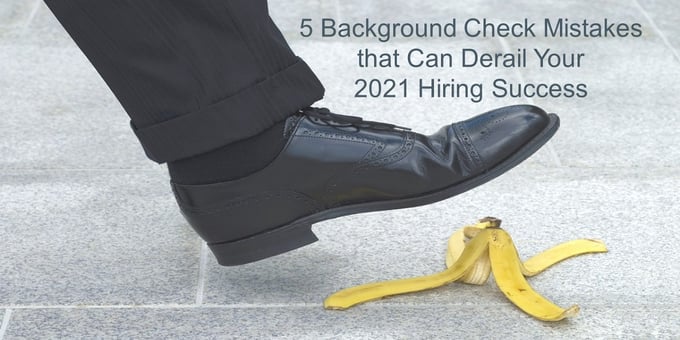5 Background Check Mistakes that Can Derail Your 2021 Hiring Success
 As we look at 2020 in the rearview mirror, our thoughts turn to the year ahead. New Years marks a fresh start and a chance to do things better than we did in years past.
As we look at 2020 in the rearview mirror, our thoughts turn to the year ahead. New Years marks a fresh start and a chance to do things better than we did in years past.
HR professionals should take this time to think about their hiring process and how they can improve it. After all, with the vaccine on the horizon for everyone, 2021 is bound to shake things up in the workforce in a variety of ways.
Making sure you crush the hiring process, land A-players, and onboard them successfully is a top priority in 2021. Unfortunately, there may be actions you’re currently taking that work against you. Here are 6 background check mistakes that can derail your 2021 hiring success.
Letting It. Drag. On. Forever.
Applicants who are languishing in limbo, waiting on an offer, will likely seek employment elsewhere.
What to do: Work quickly and make decisions as fast as you can. Keep the applicants informed by communicating with them consistently throughout the process, including informing them about the next step. If your background checks are taking a long time, talk to your customer service about decreasing your turnaround times so you can move forward. Or, go ahead and make an offer contingent on a satisfactory background check report.
Screening Every Candidate the Same Way
Using a blanket background screening process can end up being unfair, discriminatory, and can cause you to miss out on hires that could have been successful employees.
What to do? A person who is applying as a heavy machinery driver may not need a criminal check, but he would need a Motor Vehicle Records check and a drug test. Set relevant screening requirements for each position in your company to maintain practices that are not discriminatory while still protecting your workplace.
Asking the Wrong Questions
In the past, it was common practice to ask questions during the hiring process that are taboo, or even illegal, now. A candidate’s income, previous conviction history, and credit history were considered an open book during the application and interviewing process, and employers made hiring decisions in part based on these pieces of background information. In the quest for fairness, states and cities have started forbidding these questions, citing that they disproportionately hinder certain populations- like women and minorities- from landing jobs with equal pay.
What to do: Avoid these questions in the beginning of the hiring process. If you’re going to ask about them, do it later in the process so other components of the applicant, like their education and experience, can be weighed into the decision. If the questions are illegal where you do business, omit them altogether.
Forgetting to Follow Adverse Action Procedures
If negative background information is uncovered, the last thing employers should do is nothing.
What to do: When employers decide against hiring someone based on whole or in part on the candidate's background check report, the FCRA requires that employers notify the applicant and send them a Pre-Adverse Action letter. This lets the person know there was something in their report that is negatively affecting their chances of being hired by you. Include a copy of the background report as well as a "Summary of Your Rights Under the Fair Credit Reporting Act."
Employers are also required to send a "Notice of Adverse Action." This lets the candidate know the information in their background report adversely affected them being hired.
Give proper time between the “Pre-Adverse Action” letter and the final letter. A five-business day timeframe is generally recommended as a best practice. There have been recent lawsuits by job candidates who were only given a three-day window, so don’t send out the final notice too soon.
Using A Sketchy Background Screening Company
Information is only as accurate and complete as the source. Untested data sources and lack of adjudication and quality controls can result in an inadequate background check report.
What to do: The Professional Background Screeners Association (PBSA) awards accreditation to companies that prove they follow stringent guidelines and practices. Choosing a PBSA-accredited company ensures you are working with a top performing background screener.
2021 will be a challenging, exciting year for employers. HR Professionals would be wise to review their current background screening policies and update them to address the current laws and trends. Avoiding these mistakes makes it easier to hire better-quality candidates faster and more seamlessly than ever.
Other posts you might be interested in
View All Posts
Taking A Pass? How to Handle Candidates You Don't Hire
Read More
Five Actions HR Should Take If Someone Doesn't Pass A Background Check
Read More
